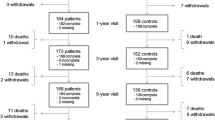Summary.
Objectives. To study the relationships between clinical features of Parkinson's disease (PD) and the development of dementia, depression or psychosis in patients with long-standing disease.
Background. The natural history of dementia and depression in PD, and its relation to psychosis in long standing PD, are unclear.
Method. 172 consecutive patients (99 men and 73 women, mean age at symptoms onset 58.3 ± 13.2 years) with 5 years or more of PD (mean symptom duration of 11.8 ± 5.6 years) were studied. Clinical data were collected during the last office visit through physical examination, detailed history, review of patient charts and outside documents. Dementia and depression were diagnosed according to DSM-IV criteria, while psychosis was diagnosed if hallucinations or delusions were present. Chi-square and t tests were used to compare the patient characteristics among those with vs. those without mental complications of the disease at different disease stages. Logistic regression was used for the comparison of associations between the presence of dementia or depression (dependent variable) and age at onset of PD, duration of PD and disease staging (explanatory variables).
Results. The study population consisted of 45 patients at Hoehn & Yahr (H&Y) stage ≤2.5 (26%), 104 patients at stage 3 (60.5%) and 23 patients at H&Y stage 4–5 (13.5%). Sixty one patients (36%) had dementia, 55 patients had depression (33%) and 50 patients (27%) had psychosis. Dementia and depression were significantly associated with disease severity as reflected in the H&Y scale (P = 0.0003, Z = 3.59; P = 0.006, Z = 3.22, respectively). These associations were significant also for the older age of PD onset (≥59 years n = 89) subgroup (p = 0.001, Z = 3.2 for dementia and p = 0.02, Z = 2.9 for depression), but not for younger onset cases (<59 years n = 83). Dementia was significantly associated with older age of PD onset (β = 0.04, p = 0.009) while depression was inversely associated with age of PD onset (β = −0.04, p = 0.02). The presence of dementia was also significantly associated with depression (β = 1.49, p = 0.0006). Dementia and depression were found to be independent explanatory variables for the development of psychosis (logistic regression, odds ratio (OR) = 26.0, p < 0.0001; OR = 10.2, p < 0.0001, respectively). In patients with younger age of PD onset, depression more than dementia was strongly correlated with the appearance of psychosis.
Conclusion. Dementia in PD was related to older age of symptoms onset and old age. Depression was associated with dementia or early age of PD onset. Depression seemed to contribute to the appearance of psychosis even more than dementia, especially in patients with younger age of symptoms onset.
Similar content being viewed by others
Author information
Authors and Affiliations
Additional information
Received January 28, 1999; accepted June 30, 1999
Rights and permissions
About this article
Cite this article
Giladi, N., Treves, T., Paleacu, D. et al. Risk factors for dementia, depression and psychosis in long-standing Parkinson's disease. J Neural Transm 107, 59–71 (2000). https://doi.org/10.1007/s007020050005
Issue Date:
DOI: https://doi.org/10.1007/s007020050005




